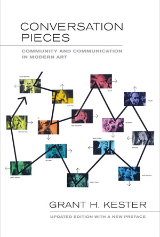Könyvajánló
Conversation pieces : community and communication in modern art
Grant H. Kester
Some of the most innovative art of the past decade has been created far
outside conventional galleries and museums. In a parking garage in
Oakland, California; on a pleasure boat on the Lake of Zurich in
Switzerland; at a public market in Chiang Mai, Thailand—artists
operating at the intersection of art and cultural activism have been
developing new forms of collaboration with diverse audiences and
communities. Their projects have addressed such issues as political
conflict in Northern Ireland, gang violence on Chicago's West Side, and
the problems of sex workers in Switzerland. Provocative, accessible, and
engaging, this book, one of the first full-length studies on the topic,
situates these socially conscious projects historically, relates them
to key issues in contemporary art and art theory, and offers a unique
critical framework for understanding them. ..
Grant Kester discusses a disparate network of artists and collectives—including The Art of Change, Helen and Newton Harrison, Littoral, Suzanne Lacy, Stephen Willats, and WochenKlausur—united by a desire to create new forms of understanding through creative dialogue that crosses boundaries of race, religion, and culture. Kester traces the origins of these works in the conceptual art and feminist performance art of the 1960s and 1970s and draws from the writings of Mikhail Bakhtin, Jürgen Habermas, and others as he explores the ways in which these artists corroborate and challenge many of the key principles of avant-garde art and art theory.
